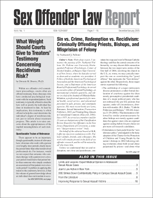Can Problem-Solving Courts Offer Lessons for Oversight of Released Sex Offenders?
Author: Roslyn Myers, Ph.D., J.D..
Source: Volume 21, Number 02, February/March 2020 , pp.19-20(2)

< previous article |next article > |return to table of contents
Abstract:
Problem-solving courts (PSCs), as the name implies, are focused on the problems that underlie behavior that leads to criminal violations. The most commonly known PSCs are drug courts, which were established to indirectly reduce crime by treating substance abuse and other serious disorders that are associated with criminal conduct. While there are many important differences between sex offenders and other types of offenders, there may be parallels worth considering in the way divergent offender populations are treated, managed, or monitored. An examination of the development of problem-solving courts, such as drug courts, may offer some lessons for the management of nonviolent, low-level sex offenders post-release, especially as registries and other law enforcement interventions are refined—and, in some instances, their effectiveness questioned.Keywords: Problem-Solving Court Model; PSC Program Design Features
Affiliations:
1: John Jay College of Criminal Justice.